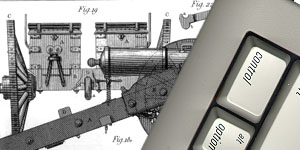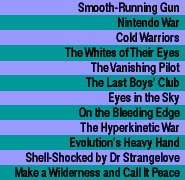


Shell-Shocked by Dr. Strangelove
What might war become thirty to fifty years hence? As far as anyone knows---at least publicly---no weapon has yet gone to war completely on automatic, although several that could do so already exist. It used to be that cold steel and a stout heart were all you needed to win a battle. No longer.Once, long ago, guns were single-shot. It took a long time to load and fire one bullet. A long, slow, and complex human process preceded the trigger pull, and a short, fast, and simple mechanical sequence followed it. The human had complete control of the machine. By the 1870 Franco-Prussian War, however, pressing the trigger of the first machine guns could result in the release of over a hundred bullets a minute. By the turn of the century, guns had evolved from dripping faucets into gushing firehoses.
It was still true that a human decision preceded pressing the trigger; barring a malfunction, nothing could happen without that decision. Even so, the human labor and decision-making involvement dropped dramatically. The machine now executed a much longer, much faster, and much more complex sequence of mechanical actions. After taking the initial decision, the human was much less in control of the machine.
What works for machine guns works for everything else about war. On the battlefield, every military commander must see what's going on, decide what to do, do it, then evaluate its effect. That see-decide-act cycle must be complete before the enemy completes its own cycle or the commander loses the initiative, and perhaps the war. Any edge in speed must be exploited.
Over the next forty years or so, under the mutagenic pressure to react faster and faster, automation may progress to the point where computers control entire ships (or tanks or planes). Today, in immediate combat, they control, or can control, weapons and sensors. Tomorrow, to speed up responses even further, they might control propulsion, maneuver, and life-support systems. Next week, they might control tactics. Of course, overall strategy will still remain with human commanders. It will still be true that, barring malfunction, the initial decision to go to deadly force will be a human one. Once that choice is made, though, each warcraft might execute a vast and intricate sequence of very fast actions, adapting its responses second-by-second.
Of course, none of that can happen in twenty years, perhaps not even in thirty; in thirty years we probably won't yet have cheap machines good enough to replace many soldiers on the battlefield. Thirty to fifty years from now, however, machines are likely to be quite capable warriors---and quite cheap. Time is on their side.
When America was testing the first stealth fighter in 1983, for instance, some computer engineers programmed it to fly itself from takeoff to landing. The plane executed all turns, minimized its exposure to detected radar sites, and even simulated dropping its bombs. Its pilot was merely along for the ride. Such advanced planes are unflyable without computer aid anyway; they're already essentially flying computers. They still have pilots for two reasons. First, human pilots, despite their enormous costs, often can handle unexpected situations; they're still far, far more adaptable than machine pilots. Second, no present-day air general would approve funding for an aircraft specifically designed not to need a pilot. Today's generals grew up in an age when that was unthinkable. Even suggesting doing away with human pilots was enough to doom your career.
Still, these generals will eventually retire, and their replacements will have seen the military and political effect of flying robots at firsthand. (For example, a downed robot plane on a covert mission is easier to disown.) So they'll be more willing to consider the idea; and when they do the arithmetic, they'll come out looking like heroes to the taxpayers and will get promoted. Even then, there will be a lot of noise about it because it will mean loss of some control, and because computers still won't be anywhere as good as human pilots. These opponents too will eventually retire. In the meantime, computers will only be getting better, cheaper, smaller, and faster.
Eventually, they will cross a threshold of cost and competence that will make their widespread adoption in cockpits unavoidable. (Not using them will be like not using rivets.) Even then, some advanced warplanes may still be piloted, because redundancy is good when lots of things can go wrong---particularly when an aircraft is carrying nuclear weapons. The electronic complexity of pilotless planes may make them less reliable than traditional planes.
Nonetheless, their attractions will be strong. Perhaps twenty to thirty years hence, an aerial attack by an advanced nation could consist of a single high-flying piloted aircraft directing a squadron of low-flying, small, cheap, fast, self-defending, and disposable robot groundattack planes. The directing craft needn't even be airborne; it could just as easily be on the ground, kilometers away. The attack could thus be directed by an army, not an air force.
Ten years after that, the cost and performance trade-offs will be even more in favor of the machine. There might by then be many robot planes, even if they still aren't quite as adaptable as piloted planes. And so it will probably go. Eventually, a generation will grow up thinking about piloted airplanes as something they learned about in a history lesson.
Aviation has already begun to hit the limits of human performance, but conditions will shortly worsen for infantries as well. Although robot tanks, for instance, have big problems with maintenance and refueling, each crew member eliminated makes them---like warplanes---that much cheaper, smaller, and more expendable. Today, they typically carry three people. In a few decades, they may carry none.
Rich nations are now deploying flying and swimming robots. Twenty to thirty years from now, they will be fielding walking, driving, and crawling robots carrying guns and bombs---big ones. Ten years after that, the face of war will have changed forever. War is now beginning to cycle at electronic speeds, and we aren't fast enough to keep making all the decisions. So, inevitably, we'll shunt more and more decision making to computers. Eventually, the only thing we may decide about any warcraft is whether or not to deploy it. Once we do, it may find its own targets and seek to destroy them without our intervention.
In one extreme version of the possible future, the only military decision we humans make comes at the beginning of the war, in the choice to go to deadly force. Once we make that decision, there may be savage and unyielding machine conflict until one side or the other is destroyed. In some sense we will still be in control: Without our initial decision there would be, barring malfunction, no carnage. Still, considering the vast difference between our sole---albeit momentous---choice and the myriad layers of contingent choices our future machines may make, we'll have little real control. Our choices will be reduced to a very narrow range, while the consequences may be drastic and widespread.
For, of course, wars won't ever be only wars of machines. As long as we make the policy, there'll be no point having a war if only machines are destroyed. Each side will do its damndest to hurt the other folks---not just their machines. That, at least today, is what wins wars. So the nation putting more human capital on the battlefield in future wars will merely be giving its enemy hostages to fortune.
Yesterday, we had armed soldiers. Today, we have manned weapons. Tomorrow, we may have autonomous warcraft. But we'll still be doing all the dying.